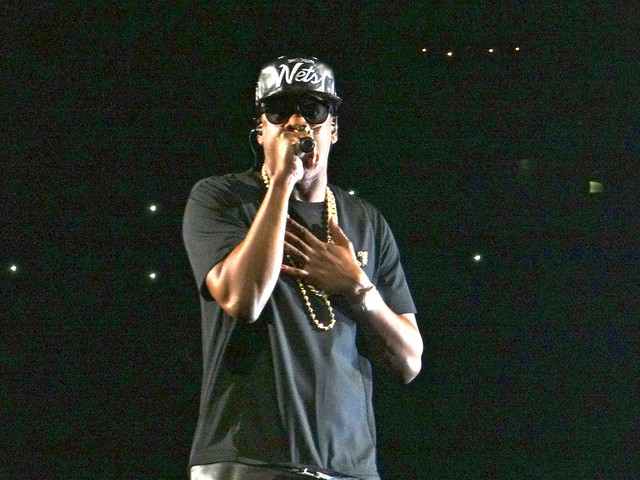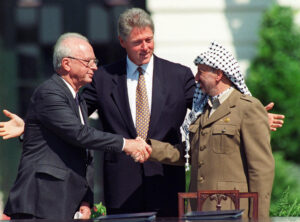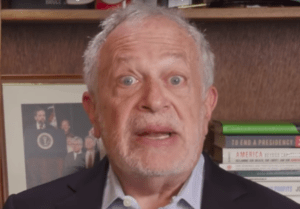Jay-Z’s Shameful Partnership With the NFL
The rapper-cum-mogul's latest business venture has fans wondering whether he's betrayed Colin Kaepernick and the black freedom struggle. Rapper-turned-impresario Jay-Z. Danielle Dalledonne / Flickr
Rapper-turned-impresario Jay-Z. Danielle Dalledonne / Flickr
What follows is a conversation between Eddie Conway of The Real News Network and several members of Baltimore’s African American community. Read a transcript of their conversation below or watch the video at the bottom of the post.
EDDIE CONWAY: Welcome to The Real News. I’m Eddie Conway, coming to you from Baltimore. I’m here in front of Conscious Head Barbershop, and we’re going to interview some of the people in the barbershop about Jay-Z’s latest deal with the football league.
ROGER GOODELL, NFL COMMISSIONER: Good man. Appreciate you. Thanks.
DARYL MCINTOSH: I respect the move, you know, Jay-Z. I follow hip-hop, so coming out of hip-hop, it’s something that’s never been done before. I respect what he’s trying to do, I guess, from the business side.
EDDIE CONWAY: Do you think it undermines what Kaepernick did when he took a knee to highlight the protests of Black Lives Matter?
DARYL MCINTOSH: I don’t think we’ve seen it yet. You know what I mean? I don’t think – I guess we’d have to see. We still have black people getting drafted in the NFL. We still have coaches. We still have people in other positions, so I don’t think that it necessarily undermines it.
KEVIN ACKWOOD: It changes the way people look at Jay-Z, because it’s totally undercutting Kaepernick and what he is trying to do—Not trying to do; the movement has already started. He set into motion from the first time he knelt.
JAY-Z: We all do different things and we all work differently for the same results. I don’t knock what he’s doing. And hopefully, he doesn’t knock what I’m doing.
KEVIN ACKWOOD: Everybody has a voice that wants to be heard. Kaepernick is just the first one to actually step up to the plate and do it. Jay-Z and Beyoncé, when the riots broke out in Baltimore, they bailed a whole bunch of people out down here. So you would think that they would be more for a revolutionary-type of movement, but it seems like they’re straddling the fence. Half and half. They’re half with the movement, and the other half against it.
RICARDO WINCHESTER: My overall impression is he’s a businessman, first and foremost. I mean, if anything you’re hearing about him, nine times out of ten it has to do with some sort of business. Up until lately, you’re hearing him more into, I guess you could say, activism.
EDDIE CONWAY: How do you think it fits into Black Lives Matter protests that’s been going around with Kaepernick taking a knee, with black people concerned about the amount of young black people being murdered by police? How do you think him lending his name and his image to the football league is undercutting that protest?
RICARDO WINCHESTER: In my opinion, what Kaepernick was doing, as far as the protest, was more symbolism over substance. I don’t think it led to any policies being passed or any of these officers going to prison for this so-called brutality that’s going—Well, it is going on.
REPORTER: Sorry to put it this way, but would you kneel or would you stand?
JAY-Z: Would I what?
REPORTER: Would you kneel or would you stand?
JAY-Z: Okay. I think we’ve past kneeling. I think it’s time to go into actionable items.
ANTONIO WILSON: He’s a big name. They need a big name right now. The black community will listen to Jay-Z more than they will listen to some old white dude that makes $50 million a year working for the NFL and nobody knows his name at all, but he’s an executive for them.
EDDIE CONWAY: So you’re saying it’s a good PR move for the white owners who are billionaires, and you’re saying that he’s kind of giving them credibility. Cred, say, for instance, by speaking out on their behalf.
ANTONIO WILSON: That’s when it gets really weird. Because he could either be a puppet, or he could be actually helping the black community.
REPORTER: Do you regard this partnership as a form of protest? I mean, are you looking to change things from the inside?
JAY-Z: Of course, yes. I’ll answer that first. I guess, I don’t have anything else to add to that. Just, yes.
JABARI NATUR: Business-wise, there’s a reason why I didn’t really like him. He came in, he was a big drug dealer, you know what I mean? He did a lot of damage at first in the community, you know what I mean, encouraging the whole drug culture and those different things, things of that nature. I didn’t like that. I didn’t agree with what Jay-Z did with the Clintons, when he stood with the Clintons, you know what I mean, when she was running for—I mean, I was like, “What is he doing?” But I still see him, on the other hand, he’s still putting out things that’s relevant, and I think he’s still teaching and, like I said, putting his life out before the world.
KEVIN ACKWOOD: I would like to know, what’s in it for Jay-Z?
EDDIE CONWAY: Or what’s in it for the black community?
KEVIN ACKWOOD: Nothing.
EDDIE CONWAY: I think this is going to make or break his image in the next few months.
KEVIN ACKWOOD: It seemed like they were trying to just use his image to breathe some life back into the football, into the NFL. Because you just took all of these protests, all of these people sacrificing their jobs, people that haven’t even lost their jobs over this, or even been shunned by the world as a whole in general, people that love the NFL that turned away from it just because of what’s been going on. It’s a lot riding on that. And then Jay-Z just goes and sweeps it under the rug basically, and sings a song and all that. He just basically is running with the NFL.
DARYL MCINTOSH: I think when we look at some of the things that Jay-Z did recently, some of the things that he’s involved himself in, you know, with the Meek Mill situation—Meek Mill’s a popular hip-hop artist, so that became a big interest of what was going on with his case. Not necessarily police brutality, but I think more on the criminal justice reform side. And I think Jay-Z kind of stepped in and played a certain role in that. It’s interesting particularly for hip-hop, I think, in my opinion, to see hip-hop be involved in these type of conversations, and especially at that level.
EDDIE CONWAY: I’m aware that he probably—Jay-Z, that is— has done a lot of things. Some of it secret, in terms of Sean Bell’s children, funds to support them, other kinds of things that’s helped the black community.
RICARDO WINCHESTER: Whatever he’s doing with the NFL, I know he has things going on with the Patriots owner and a few other people as far as prison reform and things like that, and getting people out of jail. So maybe the NFL can partner in that effort, but I don’t see how anything else could come out of it.
EDDIE CONWAY: Are you aware that his getting people out of jail has something to do with his business deals with the electronic monitoring out in the community?
RICARDO WINCHESTER: Yeah. Yeah, I heard about that.
EDDIE CONWAY: His company is selling the software that is being used to watch the electronic monitors that people are forced to wear and—
RICARDO WINCHESTER: Right. That’s why I say he’s a businessman, first and foremost. Yeah.
EDDIE CONWAY: And he’s making money off of that.
RICARDO WINCHESTER: Right.
EDDIE CONWAY: Maybe it’s prison reform in the sense that they’re not inside the prison, but now those bracelets are turning their homes into little prisons in the community. Is that the kind of reform you’re looking for, you would like to see?
RICARDO WINCHESTER: No. Not really, no. I mean, I guess you could say it’s a step in the right direction because maybe they not away from their families— if you want to look at the bright side of it. But other than that, no. I mean, prison reform, in my opinion, should be people just not being put in prison over these petty things and nonviolent drug offenses, and things like that.
JABARI NATUR: I would say so far as the industry is concerned, and somebody like Jay-Z, and when you’re dealing with the NFL, when you’re dealing with all these billionaires and people who got a whole lot of money, it’s a lot of gangster inside that organization, too, you know what I mean? You know what I mean? At some point, it could be like, “Hey, you’re going to do this.” Or, “This is what’s going to happen.” These are billionaires. These are people who got their money, a lot of them, from dirty stuff in the past, you know what I mean? So it could—
EDDIE CONWAY: Including him?
JABARI NATUR: Yeah, including him. Yeah, yeah, including him. Definitely. Definitely. Oh, and he know that. That’s why he know he got a lot of cleaning up to do.
Your support matters…
Independent journalism is under threat and overshadowed by heavily funded mainstream media.
You can help level the playing field. Become a member.
Your tax-deductible contribution keeps us digging beneath the headlines to give you thought-provoking, investigative reporting and analysis that unearths what's really happening- without compromise.
Give today to support our courageous, independent journalists.





You need to be a supporter to comment.
There are currently no responses to this article.
Be the first to respond.